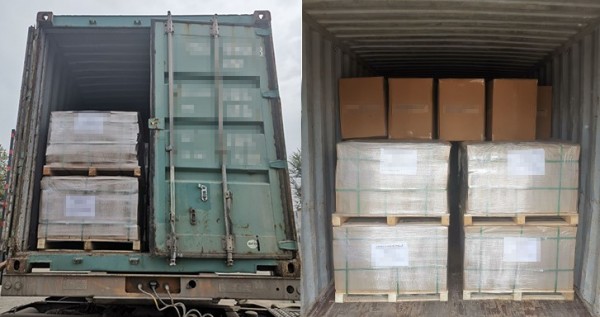Video Link: https://www.youtube.com/embed/y-EucppFGS4
In Oct. 25 tons refractory fire bricks and 45 CBM ceramic fiber blankets are packed for delivering to customer of Topower High Temperature Materials Co., Ltd. in Mexico. This passable customers will talk about how to choose ceramic fiber blankets.
Whenever customers want to know whether the food is new or not, customers often start with its surface color and appearance. Similarly, when customers choose ceramic fiber blankets in Ceramic Fiber Blanket Factory, they always look at its whiteness and regularity. Today Aladdin lets customers know how to identify the performance and quality of ceramic fiber blankets from three methods!
1. Look at the color
The classification of ceramic fiber blankets in Ceramic Fiber Blanket Factory is based on the purity of alumina in the product. From this perspective, this selection inertia still makes sense. For example, the ordinary type is made of virgin material, with more impurities, and the color is slightly dark yellow; the standard type is somewhat dull in white; if it looks white and bright at first glance, it is designated as a material of high purity or above; it is worth noting that, The zirconium-containing type with higher temperature resistance is more milky in color. Don’t be surprised if customers see a yellow-green fiber blanket in Ceramic Fiber Blanket Factory, it is a chromium-containing fiber blanket with chromium added, which can withstand high temperatures of 1400 °C
2. Get started
To identify ceramic fiber blankets in Ceramic Fiber Blanket Factory, it is still necessary to try it out. Generally speaking, high-quality ceramic fiber blankets have clear texture, regular acupuncture patterns and low slag ball content. Tear by hand, the fiber blanket with strong toughness is the top grade.
3. Touch
Spinning blankets and blowing blankets can be distinguished by touch. Ceramic fiber blankets in Ceramic Fiber Blanket Factory are spun silk type, the fibers are long and thick, they are sticky to the touch, and the toughness is strong and should not be broken; while the fibers of the blow blankets are thin and short, soft to the touch, fluffy, and insufficient tension. Therefore, silk cotton is generally used as a high-temperature thermal insulation blanket or processed into modules, while blown cotton is mostly used to make ceramic fiber paper and ceramic fiber board.
4. Summarize
Of course, the above methods are only applicable to the overall grasp of product quality. In order to obtain the exact index data of the ceramic fiber module in Ceramic Fiber Blanket Factory, it is necessary to send samples to a professional refractory testing center for testing.
Topower High Temperature Materials Co., Ltd. as a Ceramic Fiber Blanket Factory has been developing for more than 30 years. It is a professional ceramic fiber manufacturer, integrating production, research and development, and engineering development. There are four major production bases in the country: Hebei, Shandong, Henan and Jiangsu, with more than 10 production lines and an annual output of over 40,000 tons.
Topower ’s ceramic fiber blankets all have corresponding test reports. If customers want to know the quality data of Topower ’s blankets, customers can add Topower ’s WeChat: Topower888.

Original Resource: https://www.tprefractory.com/news/customers-in-mexico-ordered-25-tons-refractory-fire-bricks-and-45-cbm-ceramic-fiber-blankets/
Media Contact
Company Name: Shandong Topower Pte Ltd
Email: Send Email
Phone: +86-138 6443 5866
Country: China
Website: https://www.tprefractory.com/
